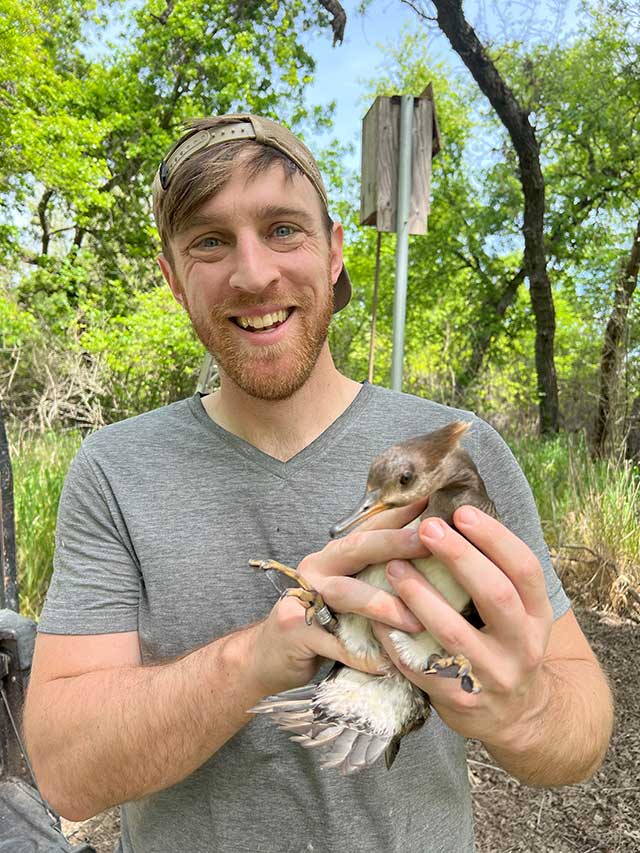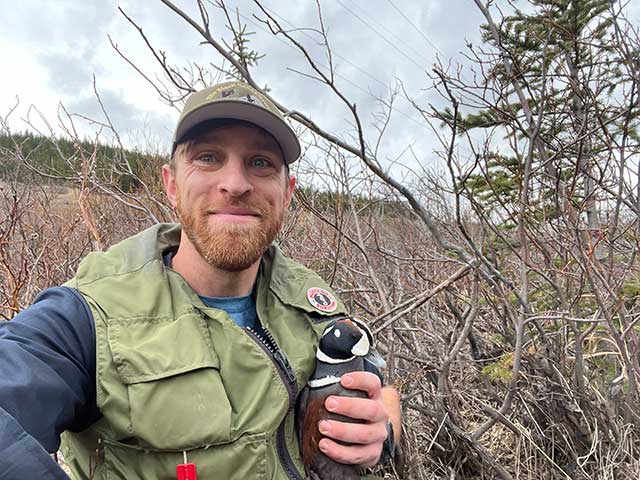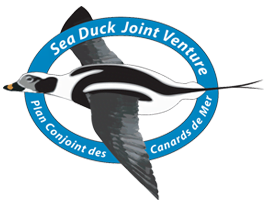
Rob holding a female hooded merganser at Bird Haven Ranch in the Central Valley of CA.
Rob Blenk is a Ph.D. candidate at the University of California, Davis, working with Dr. John Eadie to inform waterfowl conservation. His SDJV fellowship project focuses on using next-generation genomic sequencing to explore whether there is evidence of genetic structuring in populations of Harlequin Ducks on the West Coast.
Rob grew up on the Olympic Peninsula of Washington state, surrounded by lush greenery and nature, and spent much time on the coast. He became familiar with sea ducks at an early age, and as he got older, spent time waterfowl hunting, hiking, and doing other outdoor activities. This time spent in nature showed him the importance of environmental stewardship and conservation and ultimately led to him pursuing work in that field. He did his undergraduate work at Oregon State, where he assisted with Dr. Bruce Dugger’s ongoing conservation work with the Koloa or Hawaiian Duck. After graduating, he spent a few years working seasonal wildlife jobs before he began pursuing his Ph.D. at the University of California Davis, where he teaches and studies wintering conditions and foraging in waterfowl.
After starting a new research project exploring genetic structure in Brant, he became interested in what other species this work could be applied to, and that led him to Harlequin Ducks. Harlequin Ducks are difficult to study – they nest in remote, mountainous, rushing streams in dense forests, and winter along rocky coastal shorelines. Rob is using his SDJV fellowship to investigate if there is evidence of genetic structuring in Harlequin Ducks using next-generation genomic sequencing. He will look for signatures of genetic structure between interior and coastal populations in the Western U.S. as well as compare genetic signatures from different wintering and breeding regions. The ultimate goal is to be able to identify the origins of wintering birds and their breeding sites through these genetic tools.

Rob holding a Harlequin Duck during fieldwork.
Rob’s project involves working with many partners, including the Washington Department of Fish and Wildlife, hunters, private companies, and academic institutions. Since Harlequin Ducks are widely distributed across the West Coast and are relatively hard to locate, it’s difficult to sample thoroughly. That’s where partnerships come in – hunters will be providing Rob with tissue samples from harvested birds, academic institutions have already given him access to over 180 archived samples, and biologists in Alberta allowed Rob to sample from a breeding population they have monitored for decades, expanding the scope of the project. These partners are a big part of what makes this project, and many others, work. Rob also shared how helpful the Sea Duck Joint Venture Student Fellowship Program has been in connecting him to new opportunities, other awardees, and potential collaborators, and is hoping to connect with others and expand his Harlequin Duck research.
Rob is looking forward to finishing his Ph.D. in the next year and hopes to stay in academia and research in the future. One thing he particularly enjoys about working with waterfowl is being able to share his enthusiasm for the species with local groups to raise awareness and support for conservation. He also enjoyed being a Lecturer at Cal Poly Humboldt’s flagship Wildlife Department and hopes to secure a position as a university professor in the future.
In his free time, he loves to backpack, hunt waterfowl, kayak, bird, and practice woodworking. Make sure you sign up for the Sea Duck Joint Venture newsletter to follow along with Rob and the other awardees!
